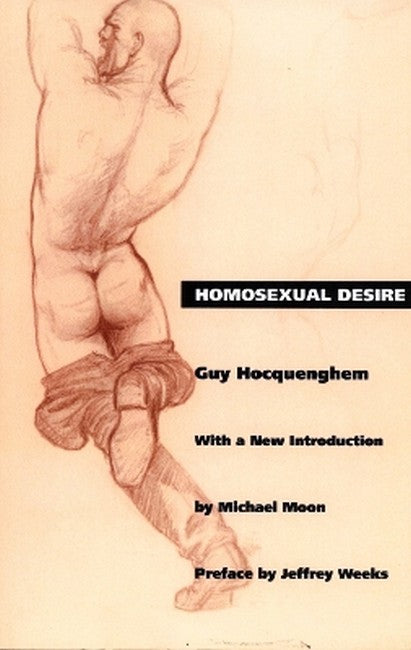Guy Hocquenghem (1944-1988) taught philosophy at the University of Vincennes, Paris. He was the author of numerous novels, works of theory, and was a staff writer for the French publication LibEration. He was a founding member of le Front Homosexuel d'Action REvolutionnaire (F.H.A.R.). Hocquenghem died of an AIDS-related illness in 1988.
Request Academic Copy
Please copy the ISBN for submitting review copy form
Description
New Introduction / Michael Moon 9 Preface to the 1978 Edition / Jeffrey Weeks 23 1. Introduction 49 2. Anti-Homosexual Paranoia 55 "Unnatural acts": nature and the law 61 A myth: the progress of public morals 62 The strengthening of anti-homosexual paranoia 66 Homosexuality and crime 67 Homosexuality and disease 69 "Latent" and "patent" homosexuality 72 3. "Disgusting perverts" 73 The polymorphously perverse, bisexuality, and non-human sex 74 Hatred of woman 77 The Oedipalisation of homosexuality 79 Castration and narcissism 79 Oedipus or the chromosomes? 82 The homosexual judge 83 Cure: the infernal cycle 86 Homosexuality and shame 88 4. Capitalism, the Family, and the Anus 93 The phallic signifier and the sublimated anus 95 Homosexuality and the anus 97 Homosexuality and the loss of identity 100 The competitive society and the rule of the phallus 103 Oedipal reproduction and homosexuality 106 Homosexual grouping 110 5. Homosexual "object-choice" and Homosexual "Behaviour" 113 The "object-choice" 114 The "third sex" and "masculine-feminine" 121 Masochism and homosexuality 127 The pick-up machine 130 6. The Homosexual Struggle 133 The revolution of desire 133 Why homosexuality? 138 The perverse trap 142 Against the pyramid 145 7. Conclusion 148 Notes 151 Index 155
"Written over two decades ago, in the aftermath of May '68 and Stonewall, Hocquenghem's Homosexual Desire may well be the first example of what we now call queer theory. But its significance is more than historical: it remains an indispensable analysis of, and polemic against, institutionalized homophobia." Douglas Crimp "Homosexual Desire represents the best of left social theory of sexual politics, a tradition that has never had an adequate reception in the United States. Reprinting this book now is a step toward recovering that tradition, and could therefore open debates about the significance of sexuality." Michael Warner "This remarkable essay was one of the first efforts to describe the psychological structure of homophobia into which we all were born and which still confine us. It examines, principally from the male perspective, the powerful and insidious ways the dominant heterosexual culture defines and marginalizes gay experience." Michael Roberts, Bay Windows (San Francisco)

